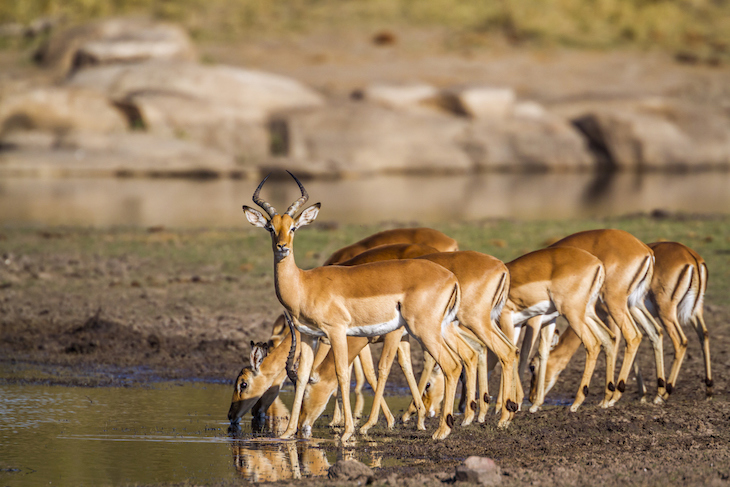Entering the Bulawayo Club, you step out of the blinding African sunshine on that safe and friendly city’s wide streets, and into the cool of a generous, mahogany-lined reception hall, its glorious art-deco doorways and fittings taking you back to another age: the early 1930s when the Club, already about 40 years old, rebuilt the clubhouse in the grand style of a confident colonial southern Rhodesia.
Facing you are two large portraits. One is of Cecil John Rhodes in tunic and wing collar. This you would expect, though the finest representation of that capable, restless, vainglorious, morally ambiguous and sometimes duplicitous achiever hangs in the Lobengula room: a light and sensitive pencil sketch of Rhodes as a very young man.
Less expected is the huge portrait that hangs opposite Rhodes on the other side of the portico. It is of Lobengula, chief of the Matabele people: brave, cruel, headstrong, perceptive — and haunted, as he went to his early and ignominious death, by the realisation that he had been outwitted by Rhodes and sold his people’s lands and birthright for a little money and a few guns. Rhodes had promised Lobengula and his people protection from the Portuguese and the Boers. He got it. What Lobengula had not understood was that he was also getting annexation to the British empire. ‘Did you ever see a chameleon catch a fly?’ asked Lobengula, sadly. ‘The chameleon gets behind the fly and remains motionless for some time, then he advances very slowly and gently, first putting forward one leg and then the other. At last, when well within reach, he darts his tongue and the fly disappears. England is the chameleon and I am that fly.’
Lobengula died in 1894. The Bulawayo Club was founded in 1895. The Matabele rebellion began in 1896. The railway reached Bulawayo in 1897. Rhodes collapsed and died in 1902. The bloody, heady, daring turbulence of those years survives only in the many paintings and prints hanging on the enormous clubhouse’s walls. Today a feeling of tranquillity, almost sanctuary, has settled on this elegant place, beautifully maintained by its 21st-century members, now of all races. You can stay there as a tourist, and it is not expensive. The bedrooms are impressive, the staff helpful, the breakfasts magnificent and the bar and billiard rooms massive. When I asked if there was a safe for passports and money, the duty manager looked almost wounded, and replied that this had never been found necessary. I cannot imagine why any Spectator reader would want to stay anywhere else.
We spent our last night in Zimbabwe there, earlier this month. It capped a week spent mostly at the other side of the country, whence we had driven. The Gonarezhou (pronounced more-or-less gonner-a-shoo) National Park. I will not bore you with checklists of all the animals we saw (almost the lot) or the sounds of jackals, hyenas and leopard in the night as we camped (disgracefully luxuriously) by the banks of a croc-infested river. Suffice it to say that on the other side of the Limpopo lies South Africa’s famous and contiguous Kruger park. Everybody goes there. Nobody goes to Gonarezhou. You should.
But no, game-spotting is a kind of train-spotting and I care for neither. For me, it’s just being in the African bush that thrills and delights. The call, like a rusty wheelbarrow squeak, of the tropical boubou bird; the coo of the Cape turtle dove; the sun on your back, the swish of invisible vervet monkeys somewhere in that tree, the exquisite red-and-white flower of the Sabi star, delicate blossom on bare wood, sweetness out of the dry earth … these take me back to my boyhood in Rhodesia. I said to our African guide, who had driven us across the Sabi (now spelt Save) river — or rather through it — ‘Don’t feel we have to see every animal; I know they can all see us and I like the feeling’, and he replied, ‘Spoken like an African. I hate the pressure when you have to spot a list of animals for visitors. Being in the bush should mean less pressure.’ But he had a gun, just in case.
I said ‘across the river’. We were based at a lodge near Chilo Gorge, where the great river rushes through throats of granite on its way through sandbanks and red cliffs to the Indian Ocean. Readers are rightly suspicious of product placement so I should tell you that though the management gave us a good rate, we were paying guests and I’d actually hesitate to be so gushing if this had been a freebie. Chilo Gorge Lodge’s grass-thatched rondavels (round dwellings) are perched high above the riverbank, and there’s something special about starched tablecloths in the open air, and sipping tea and savouring real marmalade on your toast while a hippo grunts and crocodiles bask not a hundred yards beneath. Saying you want your impala steak rare, while from across the river a lion roars, makes you feel like two of a kind: in Oscar Wilde’s words, feasting with panthers.
And nature is red indeed in tooth and claw. And jaw. Driving a dirt track with the Lodge’s Clive Stockil (who is spearheading an ambitious outreach project with the local African community), we passed on the roadside a man who appeared to be wearing his jacket casually over his shoulders. He was called Maxwell. He had no arms. An enormous crocodile had lunged at him out of the water as he was fishing. He was off-guard. Crocs never are. A bloody struggle ensued. Maxwell’s friend leapt in to help. Finally the pair got Maxwell back on to the bank. But the croc left with both his arms.
Mr Stockil is getting advice from a prosthetic surgeon and needed to photograph the stumps. Meanwhile Maxwell’s little son, Crispin, about nine, who accompanies his poor father everywhere to help him, stood faithfully by. I like stories with happy endings, so it’s with that motive, rather than virtue-signalling, that I tell you we’ve set up a little fund for the boy’s education. It isn’t much.
And I’m going to apply for country membership of the Bulawayo Club.
Got something to add? Join the discussion and comment below.
Get 10 issues for just $10
Subscribe to The Spectator Australia today for the next 10 magazine issues, plus full online access, for just $10.
You might disagree with half of it, but you’ll enjoy reading all of it. Try your first month for free, then just $2 a week for the remainder of your first year.















Comments
Don't miss out
Join the conversation with other Spectator Australia readers. Subscribe to leave a comment.
SUBSCRIBEAlready a subscriber? Log in